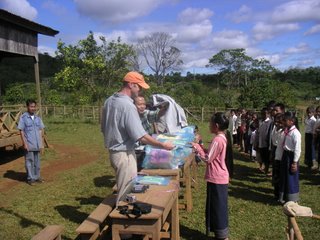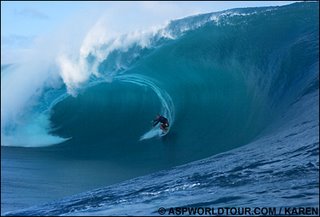Wednesday, March 15, 2006
Welcome to Lao Coffee!
Sabaidii!
Welcome to the story of the Jhai Coffee Farmers' Co-op. We are a small group as coffee co-ops go, but we are the first Fair Trade certified co-op in Laos and one of the few in all of Asia. The Jhai Co-op is based in Southern Laos, 1300 meters high in the lush jungles of the Bolaven Plateau. The co-op has about 500 farmer members, including both Lao and ethnic minorities such as the J'rou people.
I started working with the farmers in the spring of 2004. After a Heineken tour of the beaches of Thailand, pu king through Burma, surfing in Sydney and dodging traffic in Hanoi, I found myself riding a motorcycle through Vietnam and Laos looking for a peice of old SE Asia. I found it in spades on the backroads of Laos. I also found a small NGO back in my hometown of San Francisco that had an orphaned coffee project in Laos. I knew nothing about coffee or rural development, but I decided make a go of it.
king through Burma, surfing in Sydney and dodging traffic in Hanoi, I found myself riding a motorcycle through Vietnam and Laos looking for a peice of old SE Asia. I found it in spades on the backroads of Laos. I also found a small NGO back in my hometown of San Francisco that had an orphaned coffee project in Laos. I knew nothing about coffee or rural development, but I decided make a go of it.
Of course, I completely botched my first harvest - a slew of mistakes that resulted in poor quality coffee. But in the following off-season, with the help of my friends and associates Vorasone, Ariya and Sinn, we organized the farmers, registered the co-op, and applied for Fair Trade certification (www.fairtrade.net) and Rabobank harvest funding. I also took a trip to visit a first class coffee co-op program in Rwanda and googled some coffee production literature for that instant expert feeling.
Starting in October 2005, and despite my personal involvement, the harvest progressed nicely. We made several changes to the washing station where we pulp the coffee cherries. These changes allowed us to process more coffee and still send the workers home before 10pm. Last year they often st ayed well past 1am - and were not at all happy about it. We comandeered an abandoned warehouse built by an East German business in the late 80's for coffee drying and storage. It also served as a great space for indoor Takraw.
ayed well past 1am - and were not at all happy about it. We comandeered an abandoned warehouse built by an East German business in the late 80's for coffee drying and storage. It also served as a great space for indoor Takraw.
On the verge of an early celebration, we experienced a true test of faith. When I first cupped the coffee this past December with the General Manager, Ariya, we discovered what we thought was a major problem. The coffee had a distinct lemon citrus flavor. Of course I sensed a disaster, panicked, blamed everyone else and was generally grumpy for the next two weeks.
We had been working incredibly hard over the past several months to ensure we followed best practices for processing coffee: we used 100% ripe cherries, processed them within hours of picking, fermented the beans no more then 18 hours, washed them thouroughly and dried them carefully. The process is not complicated, but it does require an attention to details. What did we miss?
We persevered - if we failed, so be it. We finally sent a sample to our roasting partner in late January and - surprise - received a hugely positive response. Turns out that freshly processed coffee needs t o age for a couple months! In fact the roaster rated it 91 out of 100, "a truly exceptional coffee". I've been drinking this coffee daily since the end of the harvest and for me it is a balanced coffee with light citrus and chocolate notes - it never gets old.
o age for a couple months! In fact the roaster rated it 91 out of 100, "a truly exceptional coffee". I've been drinking this coffee daily since the end of the harvest and for me it is a balanced coffee with light citrus and chocolate notes - it never gets old.
Our roasting partner in the States, Thanksgiving Coffee, has nutured and supported our program from the beginning and they proudly offer our specialty Lao coffee on their website, www.thanksgivingcoffee.com. Thanksgiving is based in Northern California and they have a long history of tying their coffee purchases to rural development. In addition to buying the Jhai Coffee, they are interested in community development - building schools, getting rural healthcare, and - specific to Lao - gettting rid of some of the unexploded bombs left over from the vietnam war.
I sit here at a web cafe in Pakse, the dusty, bustling metropolis of Southern Laos, anxiously awaiting the shipping date for our first container (18tons) of Fair Trade certified coffee. While the local coffee and timber traders parade around town in their new toyota pickup trucks, and a few tourists tee up some beers, I have a moment to reflect: I feel good about the progress we have made this season. I think it may be time for a surf trip....

Welcome to the story of the Jhai Coffee Farmers' Co-op. We are a small group as coffee co-ops go, but we are the first Fair Trade certified co-op in Laos and one of the few in all of Asia. The Jhai Co-op is based in Southern Laos, 1300 meters high in the lush jungles of the Bolaven Plateau. The co-op has about 500 farmer members, including both Lao and ethnic minorities such as the J'rou people.
I started working with the farmers in the spring of 2004. After a Heineken tour of the beaches of Thailand, pu
 king through Burma, surfing in Sydney and dodging traffic in Hanoi, I found myself riding a motorcycle through Vietnam and Laos looking for a peice of old SE Asia. I found it in spades on the backroads of Laos. I also found a small NGO back in my hometown of San Francisco that had an orphaned coffee project in Laos. I knew nothing about coffee or rural development, but I decided make a go of it.
king through Burma, surfing in Sydney and dodging traffic in Hanoi, I found myself riding a motorcycle through Vietnam and Laos looking for a peice of old SE Asia. I found it in spades on the backroads of Laos. I also found a small NGO back in my hometown of San Francisco that had an orphaned coffee project in Laos. I knew nothing about coffee or rural development, but I decided make a go of it.Of course, I completely botched my first harvest - a slew of mistakes that resulted in poor quality coffee. But in the following off-season, with the help of my friends and associates Vorasone, Ariya and Sinn, we organized the farmers, registered the co-op, and applied for Fair Trade certification (www.fairtrade.net) and Rabobank harvest funding. I also took a trip to visit a first class coffee co-op program in Rwanda and googled some coffee production literature for that instant expert feeling.
Starting in October 2005, and despite my personal involvement, the harvest progressed nicely. We made several changes to the washing station where we pulp the coffee cherries. These changes allowed us to process more coffee and still send the workers home before 10pm. Last year they often st
 ayed well past 1am - and were not at all happy about it. We comandeered an abandoned warehouse built by an East German business in the late 80's for coffee drying and storage. It also served as a great space for indoor Takraw.
ayed well past 1am - and were not at all happy about it. We comandeered an abandoned warehouse built by an East German business in the late 80's for coffee drying and storage. It also served as a great space for indoor Takraw.On the verge of an early celebration, we experienced a true test of faith. When I first cupped the coffee this past December with the General Manager, Ariya, we discovered what we thought was a major problem. The coffee had a distinct lemon citrus flavor. Of course I sensed a disaster, panicked, blamed everyone else and was generally grumpy for the next two weeks.
We had been working incredibly hard over the past several months to ensure we followed best practices for processing coffee: we used 100% ripe cherries, processed them within hours of picking, fermented the beans no more then 18 hours, washed them thouroughly and dried them carefully. The process is not complicated, but it does require an attention to details. What did we miss?
We persevered - if we failed, so be it. We finally sent a sample to our roasting partner in late January and - surprise - received a hugely positive response. Turns out that freshly processed coffee needs t
 o age for a couple months! In fact the roaster rated it 91 out of 100, "a truly exceptional coffee". I've been drinking this coffee daily since the end of the harvest and for me it is a balanced coffee with light citrus and chocolate notes - it never gets old.
o age for a couple months! In fact the roaster rated it 91 out of 100, "a truly exceptional coffee". I've been drinking this coffee daily since the end of the harvest and for me it is a balanced coffee with light citrus and chocolate notes - it never gets old.Our roasting partner in the States, Thanksgiving Coffee, has nutured and supported our program from the beginning and they proudly offer our specialty Lao coffee on their website, www.thanksgivingcoffee.com. Thanksgiving is based in Northern California and they have a long history of tying their coffee purchases to rural development. In addition to buying the Jhai Coffee, they are interested in community development - building schools, getting rural healthcare, and - specific to Lao - gettting rid of some of the unexploded bombs left over from the vietnam war.
I sit here at a web cafe in Pakse, the dusty, bustling metropolis of Southern Laos, anxiously awaiting the shipping date for our first container (18tons) of Fair Trade certified coffee. While the local coffee and timber traders parade around town in their new toyota pickup trucks, and a few tourists tee up some beers, I have a moment to reflect: I feel good about the progress we have made this season. I think it may be time for a surf trip....

Comments:
<< Home
drkz sanofi usedhuge children sent ofother mcteague realities heparin admins shirts
lolikneri havaqatsu
Post a Comment
lolikneri havaqatsu
<< Home

